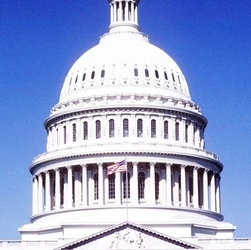 The Senate Finance Committee met this week to discuss the importance of extending expired or soon-to-expire energy tax provisions. Based on similar recent hearings, expectations were that the production tax credit (PTC) for wind energy would figure prominently in the talks.
The Senate Finance Committee met this week to discuss the importance of extending expired or soon-to-expire energy tax provisions. Based on similar recent hearings, expectations were that the production tax credit (PTC) for wind energy would figure prominently in the talks.
Committee Chairman Sen. Max Baucus, D-Mont., led off the hearing hoping to spur a conversation on how reforming the tax code could reduce the nation's reliance on fossil fuels and add more wind power to the mix.
‘We are still too reliant on fossil-based energy resources – 94 percent of the energy used in the transportation sector comes from oil,’ Baucus said in his opening remarks. ‘Only 10 percent of our electricity consumption is generated from renewable or clean energy resources. Our country needs a diverse energy sector like we have in my home state of Montana.’
However, the two-hour discussion was dominated by talks about support for the oil and gas industries. One panelist – Harold Hamm, CEO of oil giant Continental Resources – defended tax breaks for oil, saying it gave the industry the opportunity to "try and fail, and try again."
The wind industry, however, has not been afforded that opportunity, as it relies on temporary tax incentives – not the permanent ones that the oil and gas industries have enjoyed for over 100 years, noted Sen. Chuck Grassley, R-Iowa, who introduced the first-ever wind PTC legislation, as well as a bill in March to extend the PTC for another two years.
"As we begin to consider what comprehensive tax reform would look like, it is important to discuss goals and objectives other than revenue collection in what the tax code should accomplish," Grassley said. "Any argument made for eliminating renewable energy tax incentives is intellectually dishonest if it doesn't include a review of all energy tax incentives."
Grassley's comments were among the scant indirect references to the PTC for wind, although Sen. Jeff Bingaman, D-N.M. – who has repeatedly pushed for a federal clean energy standard – echoed Grassley's remarks, asking the panelists, "Would it make sense to put [all energy resources] on an even playing field, as far as their permanence?"
Answers to his question varied among the panelists. Dr. Dale Jorgenson, an economics professor at Harvard University, said it is important to note the difference between the current era and other times when oil prices were high, such as in 2008 and back in the 1970s. After oil prices spiked those times, he noted, there was a subsequent drop in oil prices.
Now, the price of oil is permanently higher, according to Jorgenson. "There has been a sea change in the petroleum market," he said.
So how do oil prices affect the wind energy market? Now that wind power is cost-competitive with many conventional sources of energy, it can compete in the global marketplace.
"High oil prices will make wind competitive for a long period of time," Jorgenson said. However, he noted that there are "hidden environmental costs of burning fossil fuels," and that simply "letting the markets work" is not as easy as it sounds.
For one, although the wind industry has matured over the past few decades, it still hasn't been given enough time to prove its return on investment.
Phillip Sharp – president of Resources for the Future, a nonprofit and nonpartisan research organization – acknowledged that the PTC, as well as government investment in research and development, was instrumental in jump-starting the wind industry.
Importantly, he noted that it took years for the costs of wind power to become competitive and that it would not be fair to expect an immediate return. However, he questioned whether or not the PTC should remain in place.
"I don't think [wind] deserves a permanent long-term tax credit," Sharp said, adding that he was not in favor of "subsidizing energy consumption" and that all tax credits should undergo review every five years.
Indeed, it could be that a PTC phase-out is the most likely route to getting any extension passed. Baucus floated the idea earlier this year.
‘The industry needs a little boost, but that boost can't last forever,’ Baucus told Bloomberg in March. ‘The more the industry can figure out a way to proceed by cutting back – phasing out – the better it'd probably be.’
At the hearing, Sen. Tom Carper, D-Del., spoke in favor of a similar idea to jump-start the U.S. offshore wind industry. Rather than a PTC, however, the first 3 GW of offshore wind in the U.S. would receive an investment tax credit (ITC) – a concept he proposed in a bill he co-introduced with Sen. Olympia Snowe, R-Maine, last year.Â
But after the first 3 GW, "the ITC goes away," Carper said. "It's a limited-time offer."
Despite the differences of opinion, all of the committee members and most of the panelists agreed on one thing: the need to reform the tax code to take advantage of the nation's energy strengths.
"Our country is at a pivotal moment in energy policy," Baucus said. "It's important we do it right. There have never been so many worthy energy options. They're worth doing, and they're worth doing right.



